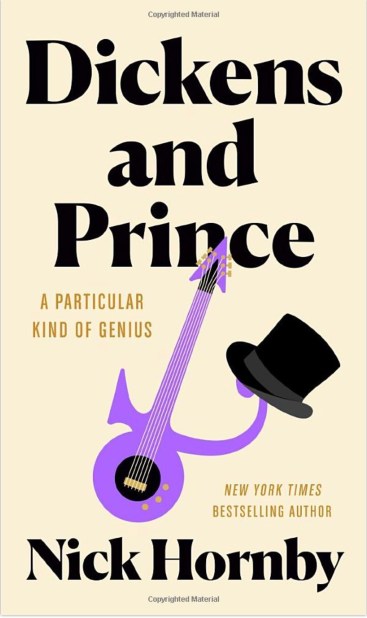Review | ’Dickens and Prince: A Particular Kind of Genius’ by Nick Hornby
Famed Fiction Writer Explores the Connection Between Two of His Heroes

The cover of Nick Hornby’s Dickens and Prince: A Particular Kind of Genius features a Victorian top hat hanging on the tip of the penis-like appendage curling from the bottom of Prince’s famous purple guitar. The jacket design is by Vi-An Nguyen, but Hornby must have been pleased to have been gifted with an image that so perfectly encapsulates his unlikely but likable exploration of the life and work of two of his heroes.
The brief book’s title is catchy because, at first glance, the 19th-century English novelist and the recently deceased American rock and soul star would seem to have so little in common. Hornby acknowledges in the opening pages that their surface similarities — one-name hyper-creative superstars who died in their late-fifties — make for a feeble connection. What really connects them is that they are, he writes, “My People — the people I have thought about a lot, over the years, the artists who have shaped me, inspired me, made me think about my work.”
However, if Hornby’s own responses to Dickens and Prince are what most clearly bind them together, he does make a plausible argument that there are a number of intriguing parallels in their lives and careers. Both men grew up poor in broken homes. Dickens famously worked as a bootblack while his family lived in the Marshalsea debtor’s prison; Prince was abandoned by his mother “and it appears he was abused, at least emotionally, by his stepfather.” Both had meteoric rises in their twenties. Dickens was writing Oliver Twist while The Pickwick Papers was still appearing in installments, and Prince’s “run of five albums” in the mid-eighties — 1999, Purple Rain, Around the World in a Day, Parade and Sign o’ the Times — would, Hornby reckons, “match any creative hot streak in the history of popular music.”
Other chapters focus on Dickens and Prince and movies (film magnified their stories and increased their fame); their working life (Hornby quotes an anonymous reviewer who complained, “’Mr Dickens writes too often and too fast,’” and “Prince wanted to roll out of bed and know that whatever he recorded that day would be good enough and then he could move on”); business (despite their success, both men felt they were getting ripped off by others — and they were); and women (“Women were their weakness. It’s such a cliché that I am embarrassed to write the sentence, but it’s true in ways that go beyond the obvious”).
Hornby’s mini-biographies are, of course, well-written, full of telling details, mini-narratives and snappy quotes (“‘He’d meet a girl and take her back to Paisley [Studios] and record a double album with her overnight,’ said [Prince’s] former manager Randy Phillips”). Above all, though, Hornby is alert to lessons that might be learned from his subject matter: “when you look again at those icons who grew up in poverty, you can see that sometimes the trauma of the past and the bewildering nature of fame catch up with you.” At the end of the book, he sums up what the two creative giants mean to him personally:
” … it doesn’t matter to me whether they last or not. That’s beyond the scope of this book. What matters is that Prince and Dickens tell me, every day, Not good enough. Not quick enough. Not enough. More, more, more. Think quicker, be more imaginative. And whatever you do for a living, that’s something you need to hear every now and again.”
And Hornby’s project — looking for commonalities between apparently disparate entities — is an endeavor we probably all out to be doing much more of in these days when, to quote Prince, “You turn on the telly and every other story / Is tellin’ you somebody died.” Sign o’ the times, indeed.
This review originally appeared in the California Review of Books.




You must be logged in to post a comment.